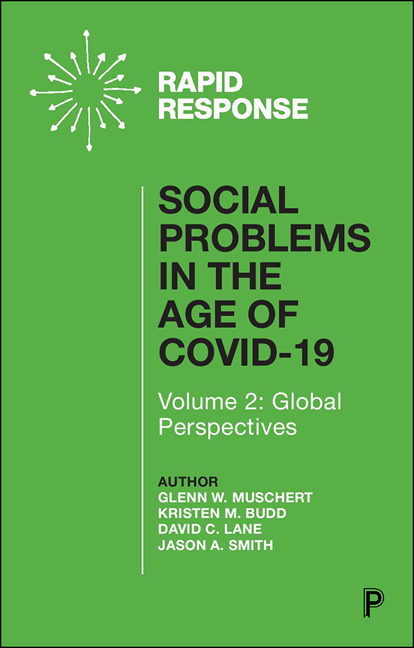Book contents
- Frontmatter
- Contents
- Acknowledgments
- Presidential Welcome
- Editorial Introduction
- 1 Isolation, Economic Desperation, and Exploitation: Human Trafficking and the COVID-19 Crisis
- 2 Uncertainty and Disruption in the Transition to Adulthood During COVID-19
- 3 Disability Rights and Healthcare Rationing during COVID-19
- 4 Social-Distancing the Settler-State: Indigenous Peoples in the Age of COVID-19
- 5 The Pandemic and the Invisible Poor of the Global South: Slum Dwellers in Mumbai, India and Dhaka, Bangladesh
- 6 The Human Right to Water and Sanitation in the Age of COVID-19
- 7 Pandemic Perils of Migrant Workers: Inequalities Intensified
- 8 Food Insecurity and COVID-19
- 9 Protecting Refugee Health and Human Rights in the Context of the COVID-19 Pandemic: Challenges and Pathways to Justice
- 10 COVID-19 Requires an Intersectional Feminist Policy Response
- End Matter
- Afterword
- Index
1 - Isolation, Economic Desperation, and Exploitation: Human Trafficking and the COVID-19 Crisis
Published online by Cambridge University Press: 23 March 2021
- Frontmatter
- Contents
- Acknowledgments
- Presidential Welcome
- Editorial Introduction
- 1 Isolation, Economic Desperation, and Exploitation: Human Trafficking and the COVID-19 Crisis
- 2 Uncertainty and Disruption in the Transition to Adulthood During COVID-19
- 3 Disability Rights and Healthcare Rationing during COVID-19
- 4 Social-Distancing the Settler-State: Indigenous Peoples in the Age of COVID-19
- 5 The Pandemic and the Invisible Poor of the Global South: Slum Dwellers in Mumbai, India and Dhaka, Bangladesh
- 6 The Human Right to Water and Sanitation in the Age of COVID-19
- 7 Pandemic Perils of Migrant Workers: Inequalities Intensified
- 8 Food Insecurity and COVID-19
- 9 Protecting Refugee Health and Human Rights in the Context of the COVID-19 Pandemic: Challenges and Pathways to Justice
- 10 COVID-19 Requires an Intersectional Feminist Policy Response
- End Matter
- Afterword
- Index
Summary
The Problem
While the world's attention has shifted to the COVID-19 crisis, many who are experiencing or who are at risk of experiencing human trafficking have lost access to resources that can provide them with protection and assistance. Human trafficking, defined by the United Nations Convention against Transnational Organized Crime as “the recruitment, transportation, transfer, harbouring or receipt of persons, by means of the threat or use of force or other forms of coercion … or of the giving or receiving of payments or benefits to achieve the consent of a person having control over another person, for the purpose of exploitation,” can take many forms. These include domestic servitude, the exploitation of migrant workers (for example, those working in the seafood processing, agriculture, and tobacco industries), forced labor in establishments such as restaurants and sweatshops, sexual exploitation, mail order brides, trafficking for adoptions, and peddling/begging rings. Trafficking was pervasive in society globally, domestically, and locally even before the pandemic began. Now, the problem has been exacerbated further.
While the exact number of trafficked individuals is not known, in 2018 the U.S. National Human Trafficking Hotline reported 10,494 human trafficking cases and 23,078 survivors. According to the human trafficking prevention organization Safe Horizon, women and girls are disproportionately affected by human trafficking, accounting for 71 percent of all survivors. The COVID-19 pandemic has, according to many reports, increased these numbers. Organizations focused on preventing and responding to human trafficking such as the Polaris Project have found that ongoing impacts of shutdowns and social distancing, including increased isolation, loss of income, loss of access to supportive resources (for example in-person interactions with service providers), hesitation to access medical services due to fear of exposure, increased online activity, and a shift of law enforcement attention away from trafficking to other issues, can place already marginalized individuals more at risk of being trafficked. Children in particular have become more vulnerable, as they are more likely to engage in online activities such as social media and video games while also being separated from mandated reporters such as teachers and guidance counselors.
- Type
- Chapter
- Information
- Social Problems in the Age of COVID-19 Vol 2Volume 2: Global Perspectives, pp. 5 - 14Publisher: Bristol University PressPrint publication year: 2020



